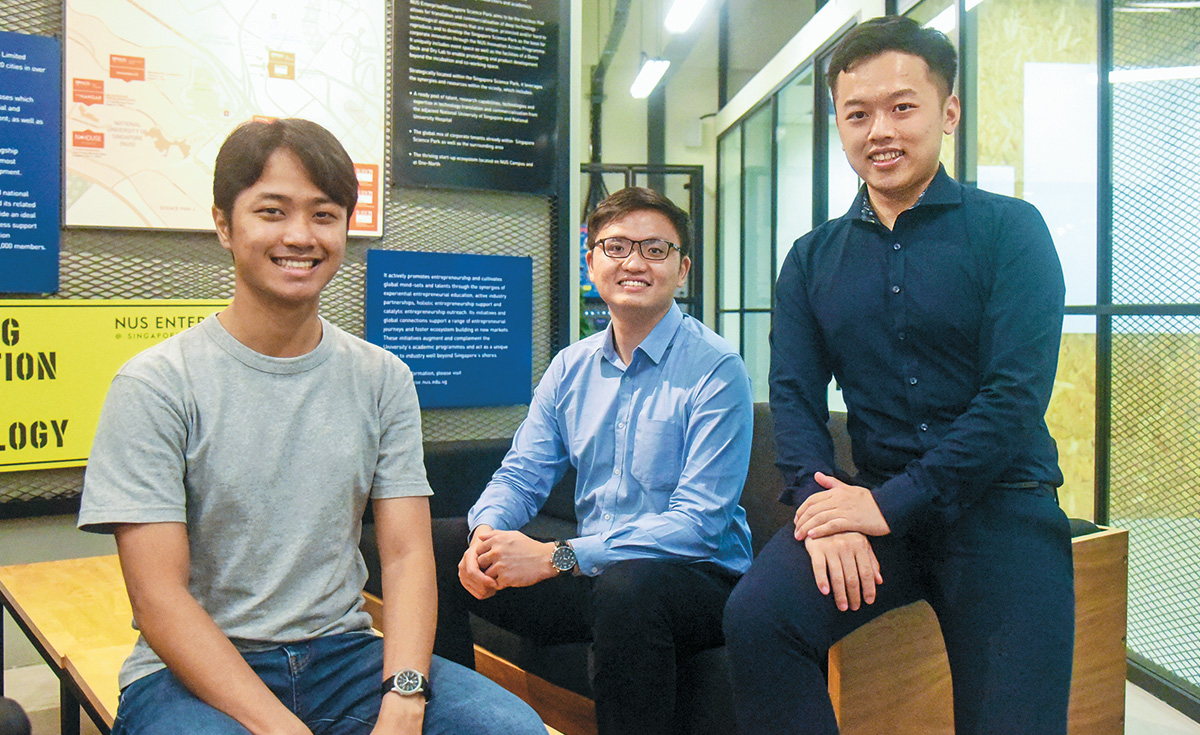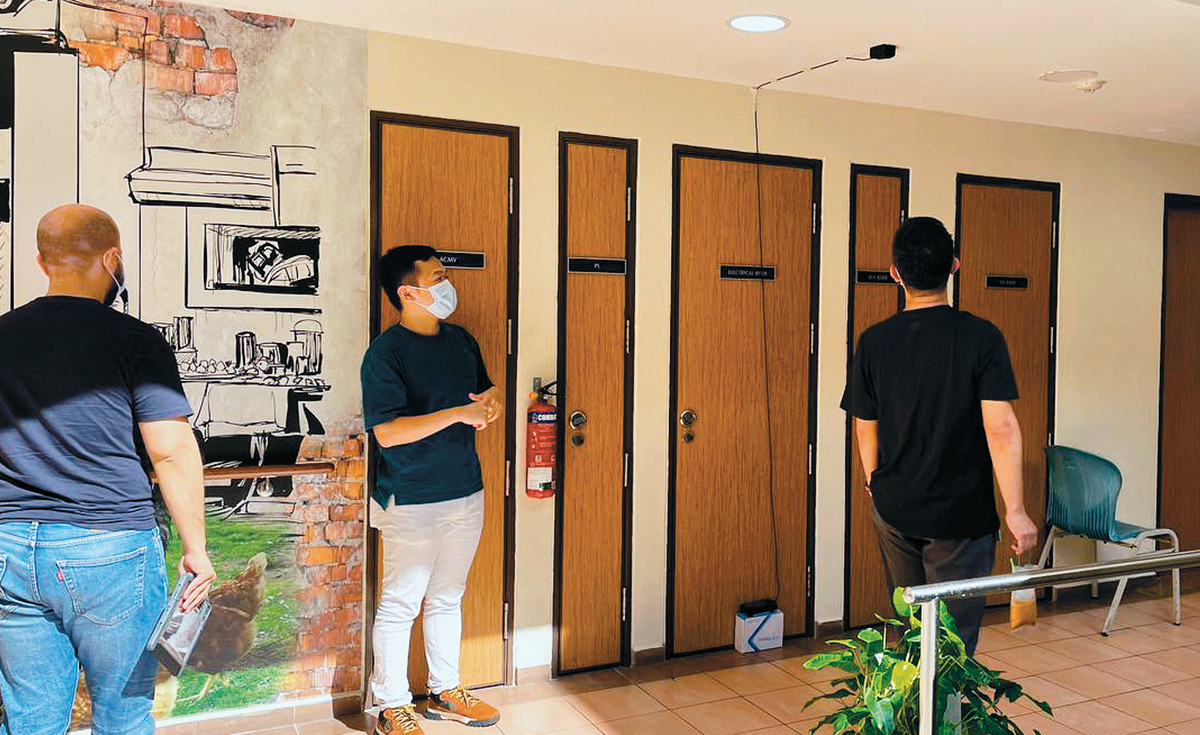Catching that Fall
How a new product by HomePal, a company set up by College of Design and Engineering alumni Mr Chen Hong Wei (’21), Mr Lai Hoi Bing (’21) and Mr Tan De Jun (’22), could protect seniors living alone.
 HomePal’s founders (from left to right) Mr Lai Hoi Bing, Mr Tan De Jun and Mr Chen Hong Wei.
HomePal’s founders (from left to right) Mr Lai Hoi Bing, Mr Tan De Jun and Mr Chen Hong Wei.
WHO THEY ARE
United by a shared passion for entrepreneurship and helping seniors, the three co-founders of HomePal are exploring the use of infrared technology to improve care for the elderly in nursing homes and private residences. The product is currently in development, and the team hopes it will hit the market in 2024.
A fall in one’s senior years can be debilitating enough. But its effects can be made worse if no one knows that you have fallen fallen until much later. This issue is especially pressing in Singapore, where more than one in ten seniors live alone. To tackle this, three NUS alumni have brought together technology and a dash of sensitivity to create HomePal, a remote monitoring solution that also protects the privacy of seniors.
The system relies on a set of infrared sensors placed around the house. These detect the movement patterns of clients and the data is fed back to a machine learning system, which learns to identify the seniors’ usual patterns. Caregivers are then notified when patterns out of the ordinary are detected. Because it uses infrared technology and not video, HomePal sensors can be placed with confidence in private areas such as bathrooms, where falls tend to take place. “We don’t want to limit the movement of seniors or make them feel like they are being watched,” shares Mr Chen Hong Wei, one of HomePal’s three co-founders.
But why would three young students be so passionate about the welfare of seniors? Mr Lai Hoi Bing, another co-founder of HomePal, points to their collective experiences. Mr Chen, 27, recalls a time when he felt ill and dizzy while alone at home. “At that moment, I was gripped by a panic of falling and without anyone knowing about it. If it was like that for me, can you imagine how seniors living alone might feel?” Being away from home also means that Mr Chen worries constantly about his parents, who are both in their 50s. Fellow co-founder Mr Tan De Jun, 25, also remembers how he came home one day to find his elderly neighbour’s domestic helper frantically looking for help. “My neighbour had fallen down and her helper could not lift her off the ground. Her helplessness and panic left a deep impression on me.” Mr Lai, 29, adds, “It’s not just our stories. We were struck by stories of seniors who had passed on in their homes without anybody knowing.”
Armed with this passion, the trio set out to create HomePal for a hackathon organised by the Housing and Development Board in 2020. Their passion and sensitive use of technology impressed the judges, and they have also garnered support from various entities, including NUS’ Resilience and Growth Inititative, the National Youth Council via its Youth Action Challenge, and the United Nations Delevopment Programme. With this, they have set out to develop HomePal further, hoping to transform it from a mere tech tool into a social enterprise that helps seniors live out their golden years more independently.
THE NEXT LEVEL
To develop HomePal further, the co-founders are in regular contact with nursing homes, who will likely be among HomePal’s biggest clients when it is eventually released. “Working with nursing homes means that the scope of the problem we’re trying to solve is much more defined, which will help as we are in the early stages of development,” explains Mr Chen, who looks at tech development for HomePal.
He likens the process of working with nursing homes to co-creating a solution: nursing home staff and resources are often stretched, so using tech like HomePal could help them improve their productivity. “But there are lots of nuances and needs that we, as non-healthcare professionals, may not understand. So it’s important for us to speak to our partners regularly to get a sense of what they need before we can think of ways that tech can solve these issues.” HomePal’s product lead, Mr Lai, adds that the early relationships they foster with stakeholders in the eldercare space, such as nursing homes, will put them in good stead for further expansion. “If we can make our impact felt in nursing homes, we may be able to grow our business to reach out to customers who live alone.”
 HOW HOMEPAL WORKS
HOW HOMEPAL WORKS
- Infrared sensors are placed around the house and feed data on movement patterns to a central dashboard.
- Machine learning algorithms help the dashboard understand what a person’s normal movement patterns are.
- When a person strays from these normal patterns, a caregiver or loved one is alerted.
 Team members conducting an on-site trial at Jamiyah Nursing Home.
Team members conducting an on-site trial at Jamiyah Nursing Home.
![]()
There’s an air of entrepreneurship and innovation in N-House and it’s infectious. Even though we were all in the final years of university and weighed down by assignments and projects, we were inspired to embark on our entrepreneurial journey.
JOURNEYING TOGETHER
The trio is currently looking to grow more partnerships and hopes to launch HomePal in 2024. Helping them on this journey are the nine or so interns who Mr Tan, Mr Chen and Mr Lai passionately mentor. “Our entire team is highly capable, with strong technical perspectives and an ability to translate these to real-world solutions,” shares Mr Lai.
The core team of Mr Chen, Mr Lai and Mr Tan is driven by a close friendship that was forged at N-House, an entrepreneurship-themed residence managed by NUS Overseas Colleges and part of NUS Enterprise. Being part of the N-House community inspired each of them to become entrepreneurs in their own right — even though they had little thought of doing so before university. “There’s an air of entrepreneurship and innovation in N-House and it’s infectious,” reveals Mr Chen. “Even though we were all in the final years of university and weighed down by assignments and projects, we were inspired to embark on our entrepreneurial journey.” Adds Mr Tan, “There was a sense of gratitude for the year we had together at N-House, and the desire for something great to come out of the time spent there.” If the potential of HomePal is anything to go by, then it looks like they have done just that.